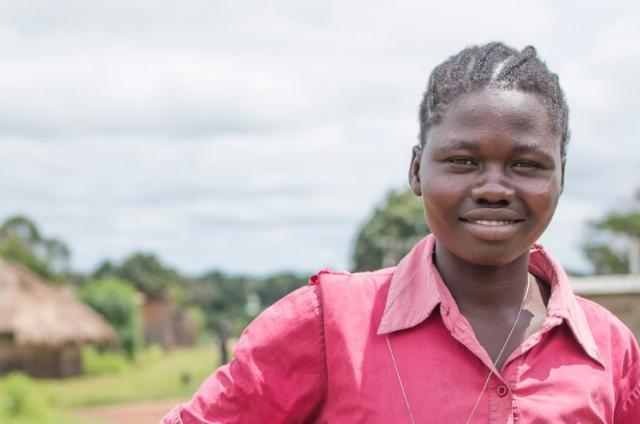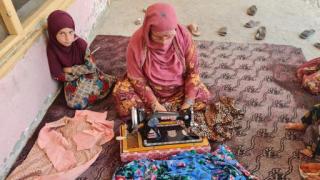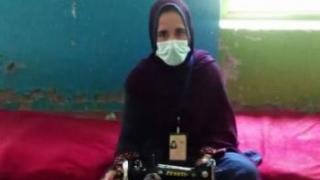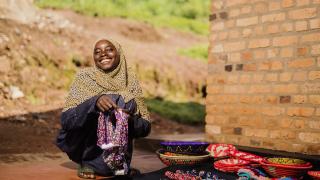Josephine's Story
My name is Josephine
At 31 years old, Josephine is married with two children. She is from Calabar in Cross River State, Nigeria. Forced to leave school when she fell pregnant, Josephine thought her education was over forever - until she joined our programme.
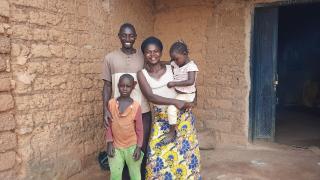
I dropped out of secondary school when I got pregnant. I eloped for fear of my father's wrath. I was a hardworking student who loved learning new things and participating in all school activities, but unfortunately, I had to leave midway.
As the fifth child in a family of ten (five boys and three girls), I had a difficult childhood filled with numerous uncertainties for my family.
My father worked as a security guard at a veterinary clinic, while my mother was a full-time housewife. She has been hypertensive for a long time, and her medications require a lot of money every month. Consequently, there was barely enough money to take care of all eight of us. With the enormous effort we put into farm work, produce was never enough to last us until another farming season. So, we went to bed hungry most nights.
All my brothers completed their secondary education regardless of the hardship because their education was a priority.
My father would always refer to us (girls) as 'another man's property'.
I spent a lot of time taking care of my mother, who would tell me stories of the challenges she faced in marriage. She told me of how my father impregnated another woman in the early years of their marriage because seven of her children died mysteriously at different times. She has always been a quiet and patient woman who suffers and smiles through the pain. She always told me and my sisters that patience is the key to a successful marriage, regardless of whatever troubles we face in life.
She encouraged us to endure and put the children first in marriage.
Life was hard at home, but things were more manageable when I met my husband, a carpenter. He gave me money to buy necessities for myself and even food for the family. I became reliant on him and subsequently became pregnant.
Although my father was poor, he was a very proud man whose ego was wounded when he found out that I was pregnant out of wedlock. The safest option was to leave home and follow my husband. After a month of co-habiting, my husband went with his parents to formally pay my dowry. The marriage was rosy initially because I was not from that environment, and people accorded me a higher level of respect than the local married women. I was treated like a queen because my husband was the last child of his family. There was no standard hospital or clinic at the time, so I had my baby at home. Due to my mother-in-law's expertise in home deliveries, I did not have any complications.
After the delivery, things turned sour for me in the family.
I had many fights with my mother-in-law at the slightest provocation, and it was impossible to avoid her because we all lived in the same house. I was exhausted from the constant quarrels and desperate to move out of the family house, and I encouraged my husband to build a small place for us away from the family house. We both worked hard doing irrigation farming to cultivate onions, cucumber and tomatoes to be able to afford mud blocks for the construction of the house. I did most of the manual labour myself to minimise the cost of building.
My relationship with my husband is somewhat smooth, except for the occasional quarrels over money. Before joining Women for Women International's Stronger Women, Stronger Nations programme, I was a full-time housewife like my mother with no source of income, so I depended on him totally for all the family needs.
He will always complain about school fees, books and other school needs. I always fought with him when it came to providing for the family's basic needs since my personal needs were never given consideration. My husband is so stingy with money that he always goes to the market to buy foodstuff to ensure that I do not get any money. He boasts of following in his father's footsteps to be prudent.
Each time we quarreled about money, I became sad knowing that if I had finished my education, I would be able to get a teaching job.
I felt depressed most times, and I knew I had to do something about that, but my opportunities were limited.
I heard about the Women for Women International programme from graduates, though the programme is famous here for its many achievements too. I was instantly interested because it sounded like an escape route from my desperate situation. I was also interested in learning a skill that will enable me to build a steady source of income so that I can finally stop depending on my husband for everything.
I was lucky to be among the 300 women who were enrolled, and we started training in April 2021.
Subsequently, things got easier as I always told him about all I learned in class every day. This made him proud and increased his status in the community. I learned a lot about women's rights, which opened my eyes to how I have been cheated in my marriage. I also learned about communicating effectively with my husband instead of being confrontational. As a result, this has improved the quality of my relationship with my husband and children.
Another significant impact of the programme is the special bond I have with my group members. We interact and discuss many issues that have been valuable to my life and the wellbeing of my family. We formed a farming group where we took turns helping each other with farm work on different days to make the job easier.
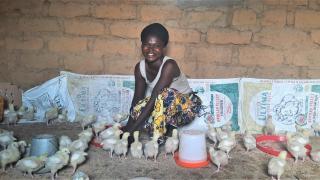
I chose poultry as my vocational skill track, and it has been an exciting experience for me because it gives me some form of independence at home. I no longer have to beg for every little thing I need, which makes me very happy.
It has also improved the relationship between my husband and me because the little quarrels and arguments about money have significantly reduced as I can now provide for myself and contribute to settling some of the children's needs.
I am sad that the programme has ended, but I am also excited that my life has changed from the pathetic condition it was before I got enrolled.
When I am financially stable, and the poultry business is well established, I would love to continue my education up to the tertiary level.
I desire to have a certificate to apply for jobs and move my children from the government school they attend to ensure they have better chances in life than I did.
I am grateful for this life-changing opportunity and pray that God will continue to bless and protect my Stand With Her sister. She has loved and supported me without knowing me, and I hope to be in the position to help other people as she has helped me.
Read more stories
Obaida
subtitle:
Being in the programme, I enjoyed having the space to connect with other women in the skill-building and social empowerment classes. I was learning things that I never imagined I would have the opportunity to learn in my life.
Nasima
subtitle:
Thanks to Women for Women International and my trainers, I now know how to sew beautiful dresses. Moreover, with the lessons I had about savings, I could save a portion of the stipends I was receiving from the programme to buy my own sewing machine.
Euphrasie
subtitle:
Through genocide, rape and the loss of two children, Euphrasie never lost hope. Read her story, from forced marriage to skilled beadworker and her family's breadwinner.

